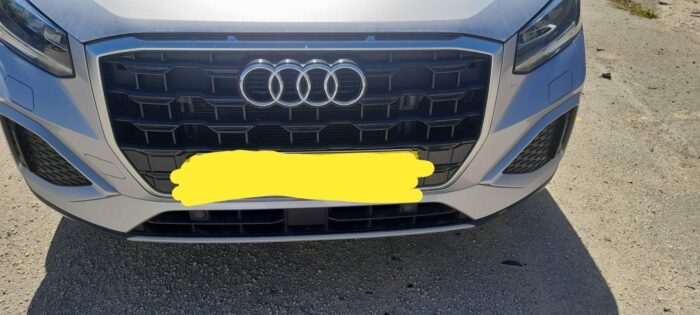Im Frühjahr 2024 nahmen wir Kontakt zu einem Ehepaar aus den USA auf, das im Sommer nach Portugal ziehen wollte. Sie wandten sich an uns, um Informationen über den Importprozess für ihre beiden Fahrzeuge, einen BMW M3 Competition aus dem Jahr 2023 und einen Audi RS 3 aus dem Jahr 2024, zu erhalten. Nachdem sie sich einen Überblick über die Kosten und Details verschafft hatten, entschieden sie sich, mit uns als Importpartner zusammenzuarbeiten.
In den nächsten Wochen tauschten wir mehrere E-Mails aus, in denen sie Fragen zur Vorbereitung ihrer Autos auf die Einfuhrbestimmungen in Portugal stellten.
Wir schlugen ihnen vor, sich an ihre BMW- und Audi-Händler in den USA zu wenden, da diese Zugang zu den europäischen Konformitätsdatenblättern haben. So konnten sie feststellen, welche Änderungen erforderlich waren.
- BMW Modifikationen: Der BMW verlangte eine Umstellung auf gelbe Blinker, da die europäischen Vorschriften von den amerikanischen abweichen, wo die Blinker rot sein dürfen.
- Audi Modifikationen: Der Audi benötigte eine Softwareanpassung für seine Beleuchtung sowie einen Kennzeichenhalter für das vordere Nummernschild, dessen Beschaffung sich als etwas schwierig erwies. Das spezielle Design des Kühlergrills des Fahrzeugs machte das Teil ohne einen kostspieligen Austausch des Kühlergrills nicht verfügbar, so dass sich der Kunde dafür entschied, das vordere Kennzeichen direkt mit Klebstoff am Grill zu befestigen.

Das Ehepaar bereitete alle erforderlichen Nachweise für den Lebensunterhalt sorgfältig vor und sammelte sie rechtzeitig und in perfekter Reihenfolge, was zu einem reibungslosen Ablauf des Verfahrens beitrug.
Einfuhrverfahren und Fehler der Behörden
Nach einer kurzen Verzögerung bei der Verschiffung kamen die Autos im August an. Wir hatten dafür gesorgt, dass die Reederei die ersten Zollpapiere ausfüllte, während wir uns um den Antrag auf steuerfreie Einfuhr kümmerten. Ohne diese Befreiung hätte das Paar Zehntausende von Euro an ISV-Steuern zahlen müssen.
Inspektions- und Dokumentationsangelegenheiten
Die Inspektion selbst verlief gut; die Änderungen wurden ordnungsgemäß durchgeführt, und die Fahrzeuge bestanden. Allerdings hat die Prüfstelle versehentlich das falsche US-Kennzeichen für den BMW eingetragen. Dieser Fehler bedeutete, dass wir zurück zum Zentrum gehen mussten, um das Formular korrigieren zu lassen, bevor wir mit dem Zollantrag weitermachen konnten, was die Dinge verlangsamte.
Überraschenderweise gelang es der Zollbehörde trotz des korrigierten Formulars irgendwie, das falsche Kennzeichen erneut auf der DAV (Zollanmeldung) zu verwenden. Wir wissen immer noch nicht, wie das passiert ist, aber wir mussten die DAV noch einmal überarbeiten lassen. Außerdem vergaß die Kontrollstelle, das Homologationsdokument abzustempeln, was aber glücklicherweise keine weiteren Verzögerungen verursachte.
Endgültige Registrierung und zeitliche Verzögerungen
Als die Dokumente den Zoll erreichten, wurden sie dank der gründlichen Vorbereitung des Paares ohne weitere Probleme akzeptiert. Seltsamerweise wurde das portugiesische Kennzeichen für den BMW jedoch etwa anderthalb Wochen vor dem für den Audi ausgestellt, was für den Kunden frustrierend war, da er warten musste. Wenigstens hatten sie ein fahrbereites Auto, während das zweite fertiggestellt wurde.
Trotz dieser Hindernisse fahren unsere Kunden heute glücklich mit ihren BMW und Audis durch Portugal!
Das Wichtigste zum Mitnehmen:
Bei der Einfuhr von Autos nach Portugal kann es zu kleinen Rückschlägen kommen - oft aufgrund von Verwaltungsfehlern oder Papierkram, den die Behörden nicht richtig erledigen. Wir arbeiten hart daran, diese Probleme zu beheben, sobald sie auftreten, aber gelegentliche Verzögerungen sind manchmal unvermeidlich.

![Im Frühjahr 2024 nahmen wir Kontakt zu einem Ehepaar aus den USA auf, das im Sommer nach Portugal ziehen wollte. Sie wandten sich an uns, um Informationen über den Importprozess für ihre beiden Fahrzeuge, einen BMW M3 Competition aus dem Jahr 2023 und einen Audi RS 3 aus dem Jahr 2024, zu erhalten. Nachdem sie einen Überblick über die Kosten und [...]](https://carimportportugal.com/wp-content/uploads/sites/100/BMW-M3-Competition.jpg)
